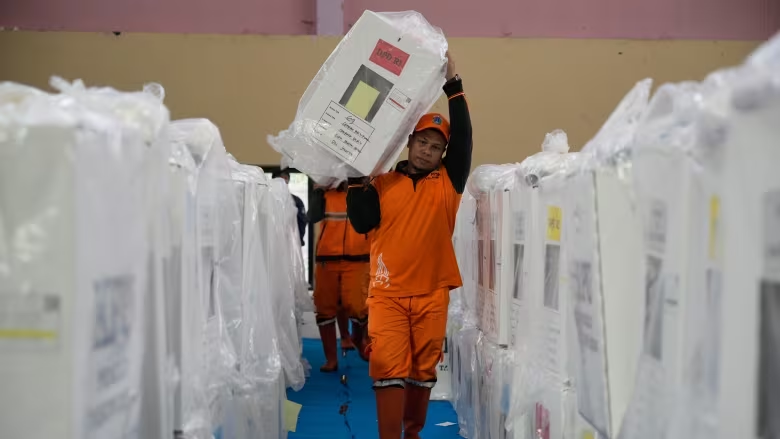
Employees transport ballot boxes ahead of Wednesday's elections at a stadium in Jakarta, Indonesia, on Tuesday. Indonesia ranked as the world's third-largest democracy, is set to commence voting on Wednesday, with approximately 205 million eligible voters participating in presidential and legislative elections. (Photo credit: Vincent Thian/The Associated Press)
In the heart of Indonesia's sprawling archipelago, an epic journey unfolds, one that traverses land, sea, and air, defying even the limits of imagination as ballot papers and boxes make their way to distant polling stations for the nation's monumental one-day election.
The stage is set for a historic event as nearly 205 million Indonesians gear up to cast their votes on Wednesday, marking a pivotal moment in the trajectory of the world's third-largest democracy.
With over 800,000 polling stations scattered across the vast expanse of some 17,000 islands, the logistical orchestration required is nothing short of breathtaking. Yet, amid the meticulously planned operation lies an element of unpredictability, with unforeseen events casting shadows of doubt over the smooth execution of the electoral process.
Yulianto Sudrajat, head of Indonesia's general elections commission, sheds light on the myriad challenges that beset the management of election logistics, ranging from time constraints and extreme weather to geographical hurdles and security disruptions.
Already, the spectre of nature's wrath has reared its head, with floods in central Java prompting the postponement of voting in several villages, while ominous warnings hint at potential disruptions looming on the western horizon.
Against this backdrop of logistical complexity and natural adversity, the nation stands poised to usher in a new era of leadership, with an open presidential race fuelling anticipation and intrigue.
As Indonesians prepare to cast their ballots, the fate of the nation hangs in the balance, with Defence Minister Prabowo Subianto emerging as the front-runner vying for the presidency. Yet, the political landscape is anything but predictable, with former Central Java governor Ganjar Pranowo and independent candidate Anies Baswedan offering compelling alternatives in a fiercely contested electoral arena.
However, beyond the presidential showdown, the election encompasses a broader spectrum of democratic participation, with voters set to elect a new vice-president, parliamentary representatives, and local officials.
Amid the fervour of democratic fervour, security remains a paramount concern, with memories of past unrest casting a shadow over the electoral process. Against this backdrop, security officials brace for potential flare-ups, determined to prevent a recurrence of the violence that marred the aftermath of the 2019 presidential election.
As the nation braces for the crescendo of electoral fervour, observers marvel at the Herculean logistical effort underway, underscoring the indomitable spirit of democracy that courses through the veins of Indonesian society.
Ben Bland, director of the Asia-Pacific program at Chatham House, reflects on the monumental undertaking, hailing it as a testament to the unwavering commitment of the Indonesian people to the democratic ideals that bind them together.
In a year marked by a deluge of elections across the globe, Indonesia stands at the forefront, poised to showcase the resilience and vitality of its democratic institutions.
As the countdown to Wednesday's election reaches its climax, Indonesians brace for a momentous day of reckoning, one that will shape the destiny of the nation for years to come.















